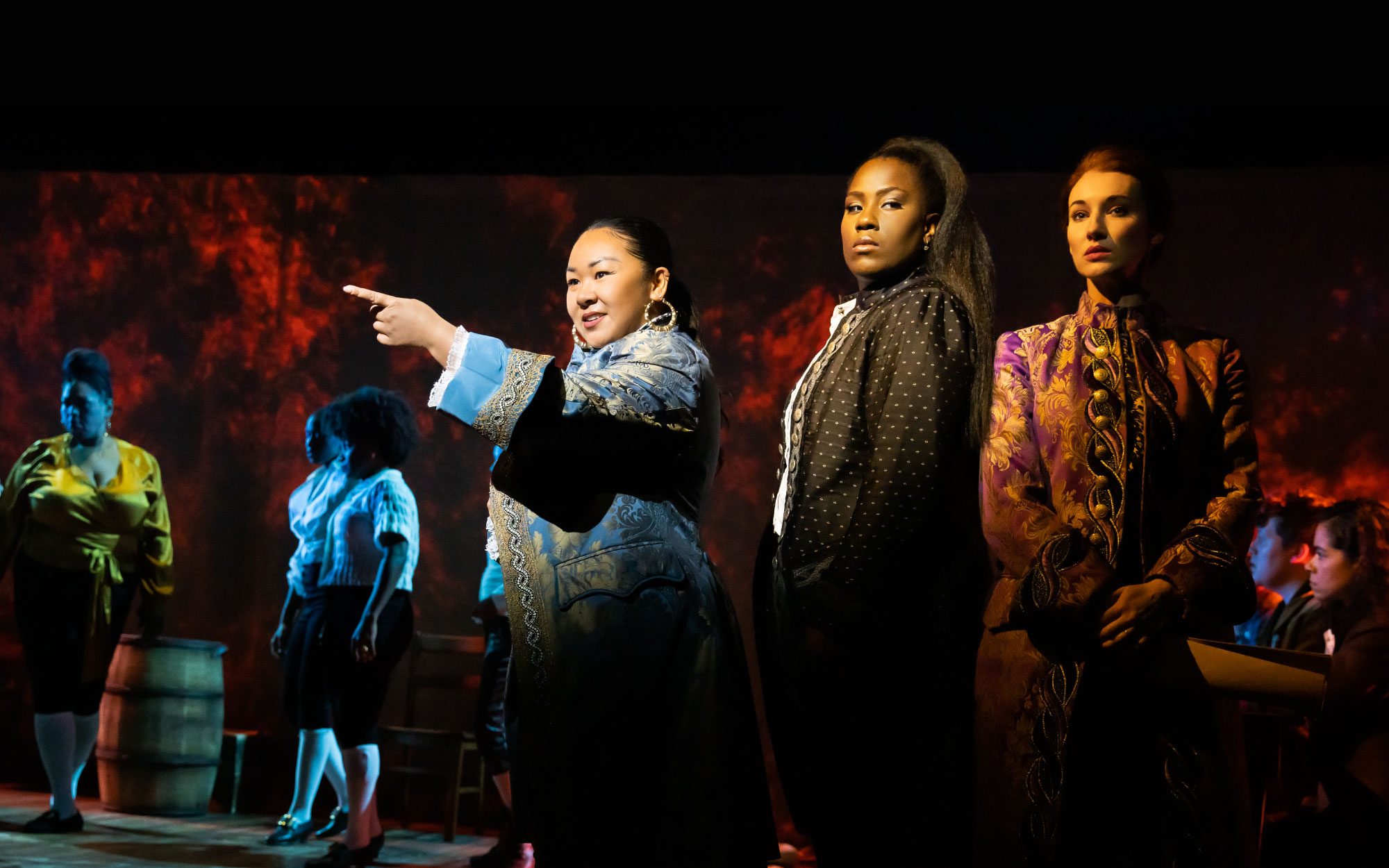Artistic Director’s Welcome
WELCOME TO 1776!
When 1776 was first suggested to me, I only knew it as the show that beat out HAIR at the 1969 Tony Awards for Best Musical. But as soon as I read the script, I understood that this musical could speak powerfully and directly to our lives today. In dramatizing the events surrounding the writing of the Declaration of Independence, 1776 points to the contradictions built into our nation’s founding—the ideals of equality and liberty celebrated and heralded in a document that achieved unanimous endorsement only after the anti-slavery clause in Jefferson’s original draft was edited out.
The reason why I do theater is to ask big questions. One of A.R.T.’s core values is inquiry, and working on this production has catalyzed a journey of learning and growth. In our creative process, we asked: How can we hold history as a predicament versus an affirming myth? How does an honest reckoning with our past help us move forward together? I hope these questions will be alive for you as you experience our production. These questions also resonate deeply with Harvard & the Legacy of Slavery, the landmark report which the university recently released to the public.
This project has centered collaboration with Co-Director and Choreographer Jeffrey L. Page and Associate Director Brisa Areli Muñoz. With the support of the estates of Sherman Edwards and Peter Stone, this production features an extraordinary cast of performers who reflect multiple representations of race, ethnicity, and gender, and who identify as female, trans, and non-binary. We invite you, the audience, to hold multiple realities at the same time: both this historical narrative and the identities of this company of artists alive in 2022. In this process, we hope that you will see the events that took place in Independence Hall in new ways.
As the professional theater company at Harvard University, the A.R.T. has the unique opportunity to collaborate with scholars and students as part of our research and development. I urge you to explore this digital guide, which highlights many perspectives on this history shared by our partners at Harvard and beyond. The educational mission of this production has been at the core of our journey, and has extended to our programs Declaration Reclamation and We Declare Boston, which invites local students to connect their own lives to the long sweep of history, grapple with its inherent contradictions, and advocate for the society in which they wish to live. Lastly, I encourage you to visit the We the People mural just off of our lobby, created through a collaboration with Artists for Humanity.
We have been waiting for two years to bring this production to our stage. As we finally welcome you to 1776, I am overwhelmed with gratitude—to all the artists and A.R.T. staff who have persevered through this difficult time, and to you, our audience and our community, who have endured this long journey with us. Thank you for joining us.
Diane
Articles
Videos
Behind the Scenes: 1776
Directors Jeffrey L. Page and Diane Paulus and Associate Director Brisa Areli Muñoz share insights into the creative process behind the A.R.T.’s production of 1776. (Jan. 2022)
The Audacity to Exist
A dynamic discussion about representation, citizenry, and what the year 1776 and the Declaration of Independence mean for our country today, and how we reckon with the past in order to understand our present moment and move forward together. Moderator: 1776 Associate Director Brisa Areli Muñoz; Participants: Harvard faculty members Vincent Brown and Timothy Patrick McCarthy; 1776 Co-Director and Choreographer Jeffrey L. Page; cast members Patrena Murray, Oneika Phillips, and Sav Souza; and 1776 developmental workshop cast member Allison Blackwell. (Sep. 2020)
Deborah Sampson Unveiled
Disguising herself as a man in order to fight, Massachusetts native Deborah Sampson (1760 – 1827) is the only woman known to have received a full pension for serving in the Continental Army fighting for American independence. What drove this Revolutionary’s break with tradition? And how has the history of gender expression in the Revolutionary period inspired the work of Emilio Sosa, costume designer of American Repertory Theater’s production of 1776? (April 2021)
1776 Salon: Performing 1776
Professors Timothy Patrick McCarthy and John Stauffer draw from their very popular course “American Protest Literature from Tom Paine to Tupac,” which they have co-taught to thousands of students in Harvard College and Harvard Extension School since 2001. (Feb. 2020)
1776 Salon: Jane Franklin’s Spectacles
Harvard Professor Jill Lepore tells the story of Benjamin Franklin’s long-forgotten sister, Jane, and meditates on what it means to write history not from what can be found, but from what has been lost. Presented in partnership with Revolutionary Spaces. (Jan. 2020)
1776 Salon: Tacky’s Revolt
Harvard Professor Vincent Brown examines the largest slave revolt in the eighteenth-century British Atlantic world, known as Tacky’s Revolt, and the roots, routes, and reverberations of this event across disparate parts of the Atlantic world. (Feb. 2020)
1776 Salon: Citizenship 1776 – 2026
As we approach the 250th anniversary of the founding of United States of America, it is worthwhile to consider what it means to be a citizen of the country that was created in 1776. Harvard Professor Annette Gordon-Reed explores the questions of how citizenship is expressed in this modern context, how we kept the republic, and what might the future hold for our republic. (June 2020)
1776 Salon: Originalism or Ancestor Worship
When Congress members want to explore new ways to interpret Constitutional clauses, they typically turn to lawyers, even though historians, political scientists, philosophers, and theologians might offer different, and perhaps better, insights. Using our nation’s current events as a case study, Harvard Law School Professor Mark Tushnet explores Thomas Jefferson’s reflections on the decline of popular constitutionalism, a model in which all citizens were encouraged to voice and offer their interpretations of the Constitution. (March 2020)
Read More
Articles and other publications that have inspired the A.R.T.’s production of 1776.

















